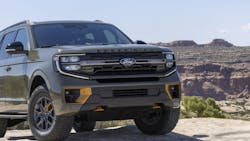Ford Leaders Trim Profit Forecast as Operational Problems Persist
Cost pressures, including from stubborn quality/warranty issues, as well as some supplier disruption eating into third-quarter sales have led Ford Motor Co. executives to lower their full-year target for adjusted profits.
Speaking to analysts after Ford reported third-quarter net earnings of about $900 million on revenues of more than $46 billion—compared to profits of $1.2 billion on $43.8 billion in sales in the same period of 2023—President and CEO Jim Farley and CFO John Lawler said their teams continue to wrestle with squeezing costs out of the operations making both older internal-combustion vehicles as well as new electric models. One example: The company has trimmed $5,000 from the cost of making the Ford Mustang Mach-E over the past two years.
But, Farley said, that achievement—which has been nullified by EV pricing pressures—and Ford’s “strategic advantages are not falling to the bottom line the way they should,” which means more work needs to be done.
“I'm proud of the progress but we’re not satisfied at all and we have a lot of opportunity,” Farley said on an Oct. 28 conference call.
Also not helping in the third quarter were Hurricanes Helene and Milton, which upset parts of Ford’s supply chain. On top of that, Lawler said “issues with a certain supplier on their productivity” also cut into sales of some Ford ICE vehicles. The combination of those cost and supply factors led Farley and Lawler to say that they now expect full-year adjusted earnings to be about $10 billion; their previous forecast had been for a number between $10 billion and $12 billion.
The Ford executives are also being cautious more broadly as they compete in an industry where demand isn’t very strong and quite price-sensitive and where interest rates haven’t fallen enough to bring in more buyers. Asked about Ford’s dividend policy relative to its cash hoard—at $28 billion, that’s now 40% above the company’s stated minimum—Lawler said he doesn’t expect a major change.
“At this point in time, where we’re at in the industry, where we’re at in the overall economic cycle, the uncertainty around the globe right now, it’s the right thing to hang onto cash,” Lawler said. “And I’m not saying there’s going to be something that happens in the global economy. I’m not saying there’s going to be some disruption. But were that to happen, we would be very pleased having this cash in hand.”
Other notes from the Ford team’s conference call included:
- Farley proclaiming his excitement about the next-generation mid-sized electric pickup the company is developing. He called the vehicle, which has yet to be revealed publicly, an “incredible package and consumer technology for a segment we know well.” On the cost side, he said it will match “any Chinese auto manufacturer building in Mexico in the future.”
“How do we know that? Because 60% of the [bill of materials] has already been quoted.” - The dropping of hints about an acquisition or big investment from Ford Pro, the company’s division focused on work vehicles. Adding to Lawler’s discussion of Ford’s cash holdings, Farley talked about also wanting to keep open his team’s strategic options and singled out Pro as being a candidate for a big investment of some sort.
“When has a car company had a chance to get the profitability of a Pro business to 20% or 30%,” he said. “That is such a special moment for our company and frankly for the industry. But that just doesn’t come from organic growth all the time. Sometimes, it takes investments in new kinds of services.”
Investors didn’t react kindly to Ford’s trimmed profitability targets Oct. 29. Heading into the last hour of regular trading, shares of Ford (Ticker: F) were down more than 8% to $10.44. Year to date, the stock is now off nearly 15%, trimming the company’s market capitalization to about $44 billion.
About the Author
Geert De Lombaerde
Senior Editor
A native of Belgium, Geert De Lombaerde has been in business journalism since the mid-1990s and writes about public companies, markets and economic trends for Endeavor Business Media publications, focusing on IndustryWeek, FleetOwner, Oil & Gas Journal, T&D World and Healthcare Innovation. He also curates the twice-monthly Market Moves Strategy newsletter that showcases Endeavor stories on strategy, leadership and investment and contributes to other Market Moves newsletters.
With a degree in journalism from the University of Missouri, he began his reporting career at the Business Courier in Cincinnati in 1997, initially covering retail and the courts before shifting to banking, insurance and investing. He later was managing editor and editor of the Nashville Business Journal before being named editor of the Nashville Post in early 2008. He led a team that helped grow the Post's online traffic more than fivefold before joining Endeavor in September 2021.
